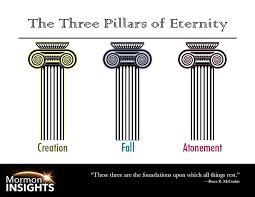Men Are, That They Might Have Joy
More Reflections on Doctrine and Covenants 29
In the previous post we learned about the eternal nature of the Lord’s work. The following verses of Doctrine and Covenants 29 reveal God’s Eternal Plan of Salvation to Joseph Smith and the six Elders who were with him. At the end of this section, the Lord reveals the beginning of His work, the three great pillars of eternity: the Creation, the Fall, and the Atonement of Jesus Christ.
The Creation:
Wherefore, verily I say unto you that all things unto me are spiritual, and not at any time have I given unto you a law which was temporal; neither any man, nor the children of men; neither Adam, your father, whom I created.
Behold, I gave unto him that he should be an agent unto himself; and I gave unto him commandment, but no temporal commandment gave I unto him, for my commandments are spiritual; they are not natural nor temporal, neither carnal nor sensual. (D&C 29:34-35)
The Fall:
And it came to pass that Adam, being tempted of the devil—for, behold, the devil was before Adam, for he rebelled against me, saying, Give me thine honor, which is my power; and also a third part of the hosts of heaven turned he away from me because of their agency;
And they were thrust down, and thus came the devil and his angels;
And, behold, there is a place prepared for them from the beginning, which place is hell.
And it must needs be that the devil should tempt the children of men, or they could not be agents unto themselves; for if they never should have bitter they could not know the sweet—
Wherefore, it came to pass that the devil tempted Adam, and he partook of the forbidden fruit and transgressed the commandment, wherein he became subject to the will of the devil, because he yielded unto temptation.
Wherefore, I, the Lord God, caused that he should be cast out from the Garden of Eden, from my presence, because of his transgression, wherein he became spiritually dead, which is the first death, even that same death which is the last death, which is spiritual, which shall be pronounced upon the wicked when I shall say: Depart, ye cursed. (D&C 29:36-41)
The Atonement of Jesus Christ:
But, behold, I say unto you that I, the Lord God, gave unto Adam and unto his seed, that they should not die as to the temporal death, until I, the Lord God, should send forth angels to declare unto them repentance and redemption, through faith on the name of mine Only Begotten Son.
And thus did I, the Lord God, appoint unto man the days of his probation—that by his natural death he might be raised in immortality unto eternal life, even as many as would believe; (D&C 29:42-43)
Thank God for faith in Jesus Christ unto repentance! Thank God for agency! Thank God for sending angels to declare repentance and redemption, through faith on the name of His Only Begotten Son! We can even thank God for the bitter that we experience during this mortal probation, without which we could not know the sweet - and thank God for the sweet! Another Divine expression of this last principle is found in the sixth chapter of the Book of Moses:
And the Lord spake unto Adam, saying: Inasmuch as thy children are conceived in sin, even so when they begin to grow up, sin conceiveth in their hearts, and they taste the bitter, that they may know to prize the good. (Moses 6:55)
Thank God that we can prize the good! Thank God for His Plan of Salvation! We can even thank God for natural death because thereby as many as believe in Jesus Christ may be raised in immortality unto eternal life!
Eternal life, immortality, faith, the Plan of Salvation, the good, the sweet, repentance and redemption, and agency: Thank God for each of these things that are only possible because of our Savior Jesus Christ.
Let’s explore the Smith and Sjodahl commentary on these passages to see what truth we can glean from it:
34-35. Not at any time *** law which was temporal] Man makes a distinction between temporal and spiritual laws, and some are very much concerned about keeping the two separate. To the Lord everything is both spiritual and temporal, and the laws he gives are consequently spiritual, because they concern spiritual beings. When He commanded Adam to eat bread in the sweat of his brow, or Moses to strike the rock that the people might drink, or the Prophet Joseph to erect the Nauvoo house, or the Saints in Utah to build fences and roads, such laws were for their spiritual welfare, as well as physical. To obey such laws, when given, is a spiritual duty. One who performs his daily labor “as to the Lord, and not to men” (Eph. 6:7) derives spiritual benefit from whatever his duties are.
“A servant with this clause / Makes drudgery divine; / Who sweeps a room as for thy laws / Makes that and th’ action fine.” - Herbert
What does it mean that all things are spiritual unto the Lord? What does it mean that the Lord’s commandments are spiritual, not natural nor temporal or carnal or sensual? In my opinion, there’s a lot more to it than what Smith and Sjodahl allude to in their commentary, but they had to begin somewhere.
36-45. In these paragraphs the Lord reveals some important truths relating to the fall of man. (1) Adam was tempted (v. 36). (2) The devil was the tempter (vv. 36-40). (3) Adam fell and was expelled from the Garden of Eden (v. 41). (4) The penalty was death (vv. 41-42). (5) Through death man goes to eternal life (v. 43); or to damnation (vv. 44, 45).
Adam being tempted] Our first ancestor was actually tempted. This was possible, because he was endowed with free agency. There can be no free agency where there is no possibility to choose between right and wrong. If only one course of action is open to us, we are not free agents. Freedom presupposes a law which can be broken as well as kept. Hence, God gave the law concerning the fruit of the trees in the garden. Adam was tempted, but, as Paul informs us, “he was not deceived” (1. Tim. 2:14), as was Eve. He partook of the forbidden fruit in order not to be separated from his wife, fully understanding the consequences. “Adam fell that man might be” (II. Nephi. 2:25).
The devil] The adversary of God and His Son, Jesus Christ, and the tempter and accuser of man. He is called the “angel of the bottomless pit,” the “messenger” or representative, of the “abysm,” (Rev. 9:11), as our Lord is the Messenger of the Great Council, or Counselor, (Is. 9:6); Sec. 10:10). The word “devil,” from “diabolus,” means “calumniator,” “accuser,” and calumny is his principle weapon of warfare. No wonder if the children of this world, who “god” he is, employ that weapon against the Saints of the Most High!
They were thrust down] See Sec. 10:10. This has reference to the rebellion in heaven. See P. of G. P., Moses 4:3-4. Revelation 12:4.
Hell] This is the place prepared for the devil and his angels, his adherents, from the beginning; that is, from the moment they were thrust out of heaven.
After our Savior has finished his work and has gained the victory over death, (1. Cor. 15:24-26.) then the devil and his angels will go to their own place which the Lord has prepared for them, sometimes spoken of as “outer darkness,” and “the bottomless pit.”
The origin of evil is not a mystery, if we understand that there cannot be free agents without temptation and a possibility of falling.
43. He might be raised in immortality] Adam transgressed and was cast out of the Garden of Eden. he was spiritually dead, because banished from the presence of God. He was subject to physical death, and we may say he was legally dead, as one under death sentence. But by the gospel which was preached to him, he came to understand that he would be raised to immortality even through the process of death.
“And in that day Adam blessed God and was filled, and began to prophesy concerning all the families of the Earth, saying, Blessed be the name of God, for because of my transgression my eyes are opened, and in this life I shall have joy, and again in the flesh I shall see God. And Eve, his wife, heard all these things and was glad, saying, Were it not for our transgression we never should have had seed, and never should have known good and evil, and the joy of our redemption, and the eternal life which God giveth unto all the obedient” (Pearl of Great Price, Book of Moses 5:10-11)
The LDS or Mormon understanding of the Fall is unique in all of Christendom, because it is true. One thing that stands out to me from the aforementioned verses in Doctrine and Covenants 29 is that Eve is not mentioned at all. Much of Christian tradition focuses on and blames Eve for the Fall, and falsely attributes “original sin” to human beings as an inherited condition from our first parents. Members of the Church of Jesus Christ of Latter-day Saints, however, believe, in opposition to the false doctrine of “original sin” that “men will be punished for their own sins, and not for Adam’s transgression.” (Articles of Faith 1:2)
Furthermore, Mormons celebrate Eve’s choice, as well as Adam’s choice, not because Eve was deceived or because Adam transgressed, but because the Fall was a necessary step forward in Heavenly Father’s Plan of Salvation. Because of Adam’s transgression, his eyes were opened, the opportunity for true joy, not merely naïve innocence, was opened to him, and he knew that he would again in the flesh see his Heavenly Father. Eve’s joy and gladness even seemed to exceed that of Adam because of her jubilant observation:
Were it not for our transgression we never should have had seed, and never should have known good and evil, and the joy of our redemption, and the eternal life which God giveth unto all the obedient. (Moses 5:11)
Without the Fall, none of us would be here on earth with the opportunity to know good and evil, the joy of our redemption, and the eternal life which God gives unto all the obedient. Without the Fall, what need would there be for the Redemption and Jesus Christ? Without the Creation, the Fall, and the Atonement of Jesus Christ, how could Redemption and Eternal Life be possible? Without the Fall, Adam and Eve would have remained in the Garden of Eden, blissfully unaware of almost everything:
And now, behold, if Adam had not transgressed he would not have fallen, but he would have remained in the garden of Eden. And all things which were created must have remained in the same state in which they were after they were created; and they must have remained forever, and had no end.
And they would have had no children; wherefore they would have remained in a state of innocence, having no joy, for they knew no misery; doing no good, for they knew no sin.
But behold, all things have been done in the wisdom of him who knoweth all things.
Adam fell that men might be; and men are, that they might have joy. (2 Nephi 2:22-25)









